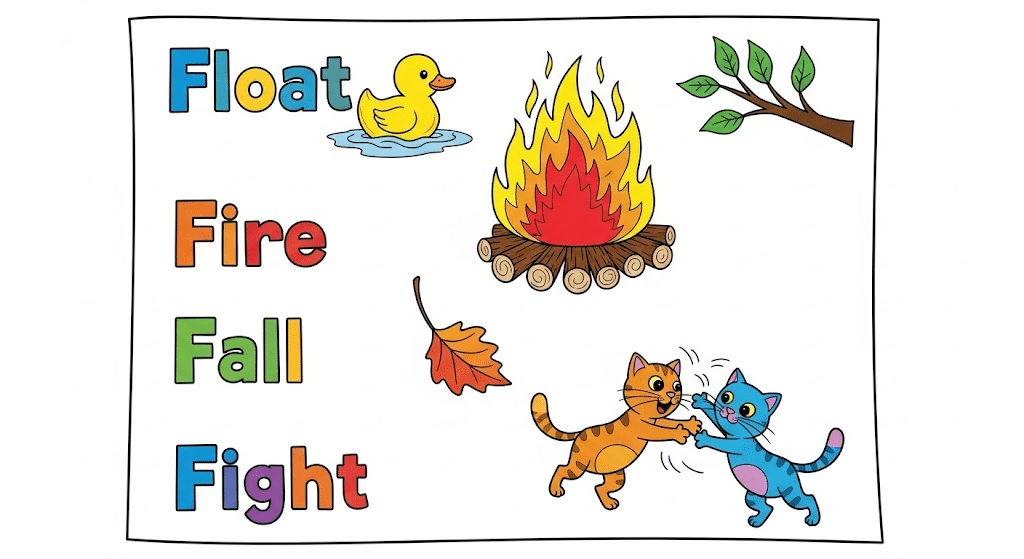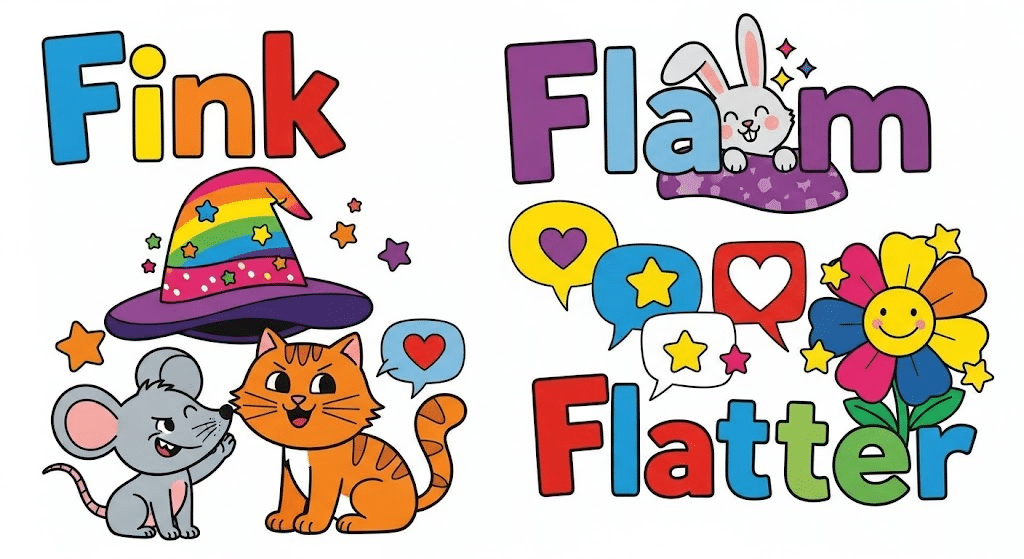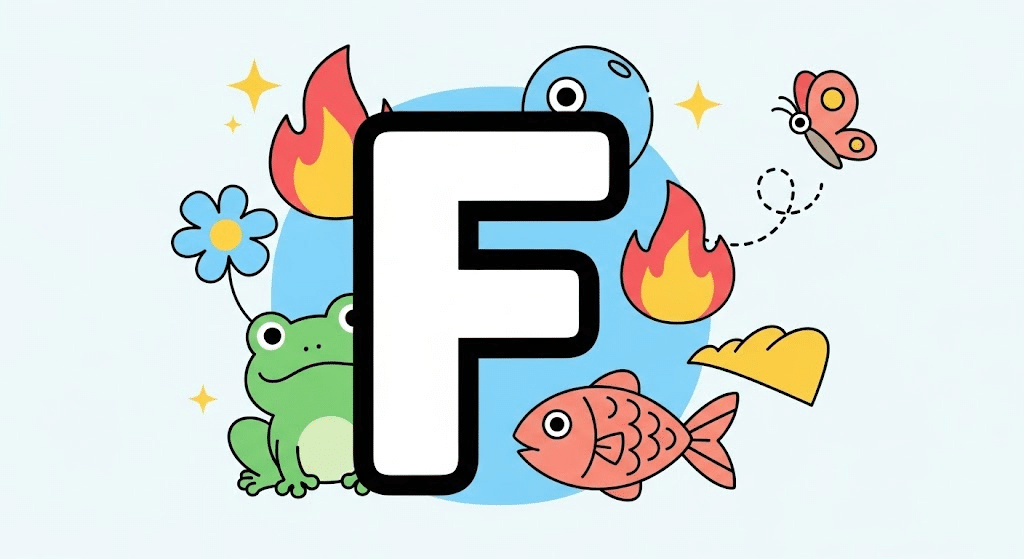Writing can feel flat when you use the same basic verbs over and over. You know the feeling, your sentences lack punch, and your words don’t grab attention like they should.
Many writers struggle with this exact problem, relying on simple verbs that make their content sound boring.
These action words will add energy to your writing and help you express ideas more clearly. Your readers will stay engaged when you use stronger, more specific verbs.
This article will share verbs that start with f. You’ll learn common ones like “focus” and “find,” plus more interesting options like “flourish” and “flicker.”
Practical Applications of Verbs
Verbs offer writers and speakers a toolkit for enhancing clarity, impact, and style. Below, you’ll find practical ways to harness the power of verbs across different forms of communication.
These action words work well in four main areas.
General Writing benefits when writers replace basic verbs with stronger alternatives. “Fled” sounds better than “went quickly.” “Forged” beats “made.” These changes create clearer pictures for readers while cutting extra words.
Daily Conversations become more confident with precise usage of verbs. Saying “I flourished at work” sounds stronger than “I did well.” Using “foster” instead of “help” shows a deeper meaning. These words make speakers sound more interesting and knowledgeable.
Academic Writing gains professionalism through formal verbs like “facilitate,” “formulate,” and “function.” These words fit research papers better than basic alternatives. Students and professionals who use them meet higher language standards while expressing complex ideas clearly.
Creative Projects come alive with expressive verbs. Words like “flicker,” “fumble,” and “freeze” paint vivid mental pictures. They help readers feel stronger emotions and stay engaged with stories, poems, and scripts.
List of Verbs that Start with F
From common verbs like “face” and “find” to advanced terms such as “facilitate” and “formulate,” and even quirky or rare words like “faff” and “flummox,” F-verbs enrich language by adding precision, variety, and color.
Below is a comprehensive list of F-verbs categorized by their commonality and usage to help you expand your vocabulary and choose the perfect word for any context.
Common Everyday Verbs

Common everyday verbs starting with the letter “F” are essential building blocks in daily communication.
1. Face
2. Fade
3. Fail
4. Fall
5. Fasten
6. Fax
7. Fear
8. Feed
9. Feel
10. Fetch
11. Fight
12. File
13. Fill
14. Film
15. Find
16. Finish
17. Fire
18. Fish
19. Fit
20. Fix
21. Flap
22. Flash
23. Float
24. Flood
25. Flourish
26. Flow
27. Flower
28. Fly
29. Fool
30. Force
31. Forecast
32. Forget
33. Forgive
34. Formulate
35. Fortify
36. Found
37. Free
38. Freeze
39. Frighten
40. Fry
41. Fuel
42. Fulfill
43. Fuss
44. Falsify
45. Fatten
46. Fidget
47. Flock
48. Flinch
49. Flirt
50. Flounder
51. Flush
52. Flutter
53. Forge
54. Form
55. Fracture
56. Frisk
57. Fumble
58. Function
69. Fund
60. Faint
Advanced, Academic, or Technical Verbs

By incorporating verbs like “facilitate,” “formulate,” and “fathom,” you can amplify your language, making your arguments more compelling and your descriptions more nuanced.
The following introduction highlights the significance of these verbs.
61. Fabricate
62. Facilitate
63. Factor
64. Familiarize
65. Fantasize
66. Fashion
67. Feature
68. Federate
69. Ferment
70. Fertilize
71. Filet
72. Finalize
73. Finance
74. Fine-tune
75. Fireproof
76. Fixate
77. Flagellate
78. Flambé
79. Flank
80. Flare
81. Flocculate
82. Floss
83. Flux
84. Foil
85. Foment
86. Foreclose
87. Foreground
88. Foresee
89. Foreshadow
90. Forestall
91. Formalize
92. Fossilize
93. Fractionate
94. Fragment
95. Fraternize
96. Freewheel
97. Frieze
98. Frivol
99. Fructify
100. Fulminate
101. Fundraise
102. Furnish
103. Fuse
104. Furlough
105. Furbish
106. Furrow
107. Facet
108. Fathom
109. Feign
110. Fester
111. Filibuster
112. Finesse
113. Flense
114. Flute
115. Foam
116. Forage
117. Forebode
118. Foreordain
Creative, Slang, or Rare Verbs

Creative, slang, and rare F-verbs add flavor, personality, and originality to language.
Incorporating these verbs can make your language more colorful and memorable, perfect for engaging audiences or adding a playful twist to your writing.
119. Faff
120. Fandangle
121. Fangle
122. Fart
123. Fawn
124. Feint
125. Fiddle
126. Filch
127. Fink
128. Fizzle
129. Flabbergast
130. Flake out
131. Flam
132. Flapjack
133. Flare-up
134. Flashback
135. Flatline
136. Flatter
137. Flay
138. Fleck
139. Fleer
140. Fletch
141. Flicker
142. Flip-flop
143. Flit
144. Flivver
145. Flog
146. Flop
147. Flub
148. Fluff
149. Flummox
150. Flunk
151. Fluster
152. Foist
153. Futz
154. Fondle
155. Footle
156. Footslog
157. Foregather
158. Forfend
159. Fork
160. Fornicate
161. Forsake
162. Fort
163. Founder
164. Fox
165. Fraction
166. Freak
167. Freckle
168. Freeload
169. Freestyle
170. Fretsaw
171. Fribble
172. Fricassee
173. Frizzle
174. Frolic
175. Frump
176. Fudge
177. Fume
178. Fun
179. Funk
180. Funnel
181. Furcate
Conclusion
Mastering verbs that start with F opens doors to better communication in every area of life.
The key is practice. Start by picking five new F-verbs each week and using them in your writing or speaking. Notice how they change the tone and impact of your messages. Your vocabulary will grow naturally over time.
Ready to take your language skills further? Check out our complete guide to power verbs across all letters of the alphabet.
You’ll find hundreds more words to strengthen your communication toolkit and impress your audience every time you speak or write.
















